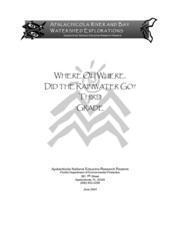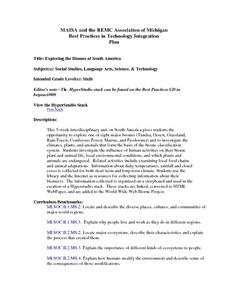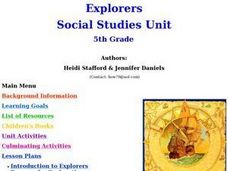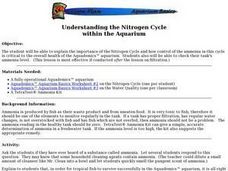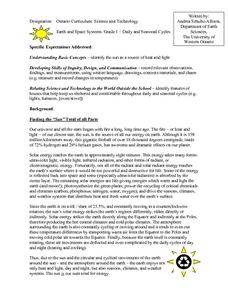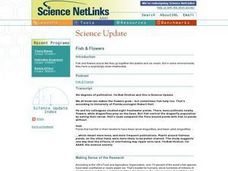Curated OER
Where Oh Where Did the Rainwater Go?
Third graders conduct an experiment to determine how water moves through different soils found in the Apalachicola River watershed. They read a scenario, conduct the experiment, answer follow-up questions, and draw the water movement...
Curated OER
Sharks: Scavenging Stomachs
Students examine the role played by sharks in the marine food chain. They conduct a scavenger hunt collecting items that have actually been removed from the stomachs of sharks, and create a display that includes the items and newspaper...
Curated OER
Critter Clues
Students work together to examine water quality. They identify the indicators of water quality and complete an experiment. They discuss their results.
Michigan Sea Grant
Sea Lamprey
Learners discuss the types of technology that are used to control the population of sea lamprey in the Great Lakes. They explain the parasite/host relationship and understand the devastating impact invasive species have on ecosystems....
Curated OER
Food Webs in a Pond
Students explore food chains and food webs in a pond and identify common creatures found in ponds. They look for tadpoles, fish, mites and other creatures in a pond during a field trip for first hand research.
Curated OER
Water Will, Water Way
Students complete a unit on biodiversity and their significance to pharmaceuticals. They
Curated OER
Exploring the Biomes of South America
Sixth graders complete a five-week unit investigating the eight major biomes of South America. They conduct Internet research, collect short-term and long-term climate data, and create a HyperStudio slideshow stack about a selected biome...
Curated OER
Great Lakes Ecology
Students are able to use a secchi disk to measure the turbidity of water by determining the depth at which the sechi disk is no longer visible and using the data in a formula to quantify the results. They are able to use Vernier probes...
Curated OER
Explorers Unit
Fifth graders complete a unit on early explorers. They develop a timeline, sing a Viking song, watch a video, compile a checklist of supplies needed for an expedition, participate in a scavenger hunt, write a letter from Christopher...
Curated OER
Understanding the Nitrogen Cycle within the Aquarium
Students discuss ammonia, and ways it may get into the aquarium. They complete a worksheet about the Nitrogen Cycle. Students learn how to get the ammonia and nitrite out of their aquarium.
Curated OER
Water Microbes and Human Health
Students research the possible sources and human health effects of microbes found in recreational and drinking water. They explore the range of negative outcomes of contact with contaminated recreational and drinking water by creating...
Curated OER
Salinity
Students take a provided ocean Trivia Quiz in order to start a discussion of the ocean. They then perform an experiment on how the amount of salt in the ocean affects it and varies from ocean to ocean.
Curated OER
Aquaculture
Students examine an experiment in which 2 types of commercial fish are fed a new type of fish feed and a commercial fish feed which costs ten times as much. They calculate in the fish grow as well with the cheaper fish feed and then...
Curated OER
Island Survival
Students participate in a simulation of life on a deserted island. They apply their critical thinking skills and knowledge of oceans and islands to "survive" and ultimately return to safety. Lesson contains adaptations for all levels.
Curated OER
Water, Water Everywhere and Not a Drop to Drink
Students discuss the importance of taking care of their water supply so not only they can use it but generations in the future. In groups, they examine a real pollution scenario in which a sewer overflowed into the ground water. They use...
Curated OER
Stream Ecology In Wisconsin and Puerto Rico
Young scholars identify the different types of water and explain in what proportions they exist on Earth. They identify and correctly label the parts of the water cycle and how these parts interact with each other. Students identify...
Curated OER
Inquiry in Science Using an Animal Behavior Model
Learners observe a planaria without a microscope and with a stereoscopic microscope. They draw the planaria and describe its motion and eating habits. Students research planarias various body systems and behavior. They design an...
Curated OER
Ecosystems of the World
Learners are able to list different ecosystems and describe their environment and organisms. They have an understanding about the function and balance of the ecosystems. Students are able to tell what type of ecosystem the St. Mary's...
Curated OER
Daily and Seasonal Cycles
First graders identify the sun as a source of heat and light. They identify features of houses that help keep use sheltered and comfortable throughout daily and seasonal cycles. Students are told that summer is the best season to...
Curated OER
Reflecting on Reflectivity
Students plan and construct a "mini-lab" to measure the reflectivity of different earth surfaces. They measure reflectivity of materials, including ice, soil, rocks, etc., and then extrapolate from what they have learned to consider the...
Curated OER
Importance of Water
Students complete a KWL chart on what they comprehend about water. They complete a water activity determining how much usable water is available, and they determine the water usage in their households. Students take notes on water and...
Curated OER
Fish and Flowers
Students read and discuss a research article that explains the unlikely link between increased fish populations and increased plant pollination. They answer reading guide questions to discover this ecological relationship.
Curated OER
Indicator Sponge A Discrepant Event Demonstration
Students explore the use of acid and base pH indicators. The teacher saturates an indicator sponge with congo red solution. Afterwards, the sponge is placed in a blue base solution. Students observe that the blue sponge actually turns...
Curated OER
Food Chain
Third graders explore why food chains are important. In this food chain lesson, 3rd graders break into small groups to represent parts of the food chain. Different amounts of food are given to each group and any spilled food will be...
Other popular searches
- Freshwater Fish
- Freshwater Ecosystems
- Fresh Water Pollution
- Freshwater Organisms
- Fresh Water Salt Water
- Freshwater and Saltwater
- Fresh Water Sources
- Fresh Water Ecosystems
- Freshwater Wetlands
- Fresh Water Biomes
- Boiling Point Fresh Water
- Freshwater Habitats


